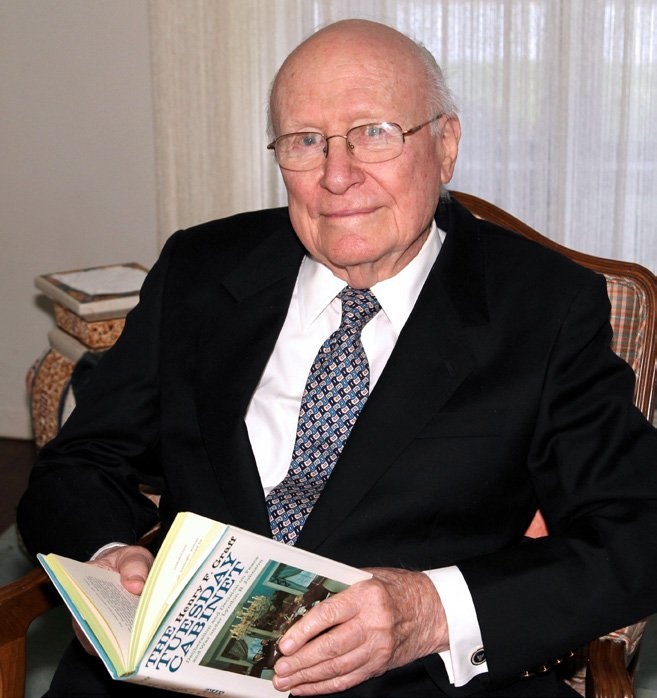Columbia College | Columbia University in the City of New York
In Memoriam: Henry F. Graff GSAS’49, Professor Emeritus of History, Presidential Scholar

Henry F. Graff GSAS’49, a professor emeritus of history and scholar of the U.S. presidency and American foreign relations, died from complications of COVID-19 on April 7, 2020. He was 98 and lived in Scarsdale, N.Y.
A Columbia faculty member from 1946 to 1991 and an oft-requested speaker at reunion dinners, Graff was born on August 11, 1921, in Manhattan to descendants of Jewish immigrants from Germany. Raised in Inwood, he graduated from George Washington H.S. at 16 and earned a B.S., magna cum laude, from City College in 1941. A Phi Beta Kappa, Graff was working toward his master’s at GSAS, and was the first Jewish student in the history department, when he enlisted in the Army in 1942.
As a result of studying Japanese at Columbia, Graff served as a Japanese language officer and cryptanalyst in the Signal Intelligence Service, the predecessor to the National Security Agency. He read foreign communications and ciphers, particularly the now-famous “Purple” code: In November 1943, Graff translated part of a message sent by Lt. Gen. Hiroshi Oshima, the Japanese ambassador to Germany, to the Japanese foreign minister in Tokyo, which recounted in detail what the ambassador had seen of German preparations in north France. Graff also translated a message from Japan to the Soviet Union, detailing Japan’s plan to get out of the war. In doing so, he was the first American to know of Imperial Japan’s imminent surrender. Graff received a War Department Citation and the Army Commendation Medal for his service.
After his discharge, Graff taught history at City College for one semester before joining the Columbia faculty. He was honored with the College’s Mark Van Doren Award for Teaching in 1981 and the Society of Columbia Graduates’s Great Teacher Award in 1982. In 2005, he was presented an honorary Litt.D. from the University. Graff also received City College’s Townsend Harris Medal in 1966, in recognition of distinguished post-graduate achievement in his chosen field.
Graff knew several U.S. Presidents personally, including Harry S. Truman and Gerald R. Ford, who sat in on his popular “Seminar on the Presidency” at Columbia in 1959 and 1989, respectively. He also knew Lyndon B. Johnson and Bill Clinton, both of whom appointed him to presidential panels. Beginning in 1971, Graff served for a number of years on the Historical Advisory Committee of the United States Air Force. He twice chaired the juries for the Pulitzer Prize in American history, and also chaired the jury for the Bancroft Prize in history, given by the Columbia University Libraries. Graff was for years a member of the Board of Directors of the Rand McNally Co., and had sat on the Board of Trustees of the Columbia University Press.
He was the author of 12 books, several textbooks and countless articles for historical and popular journals and magazines; he described his best-known book, The Tuesday Cabinet: Deliberation and Decision on Peace and War Under Lyndon B. Johnson (1970), as “an effort at explaining the administration’s Vietnam policy as the president and his chief aides said they understood it.”
Graff had been a visiting professor at Vassar College and lectured on many other campuses; he had been the distinguished speaker at the U.S. Air Force Academy, as well as the Sol Feinstone Memorial Lecturer at the Jewish Theological Seminary.
Graff married Edith Krantz in 1946; she died in 2019. He is survived by their daughters, Iris Morse and her husband, Andrew Morse, and Ellen Graff BC’77, LAW’78 and her husband, Martin Fox; five grandchildren; and five great-grandchildren. Graff’s twin sister, Myra Balber, predeceased him.
A memorial service will be held at a later date. To make a memorial contribution, contact Regina Ketting, director of gift planning in the Office of Alumni and Development.
Issue Contents
Published three times a year by Columbia College for alumni, students, faculty, parents and friends.
Columbia Alumni Center
622 W. 113th St., MC 4530, 6th Fl.
New York, NY 10025
212-851-7852
cct@columbia.edu
Columbia Alumni Center
622 W. 113th St., MC 4530, 4th Fl.
New York, NY 10025
212-851-7488
ccalumni@columbia.edu

